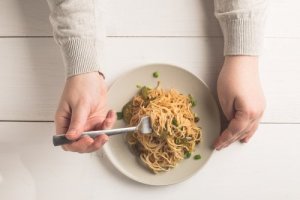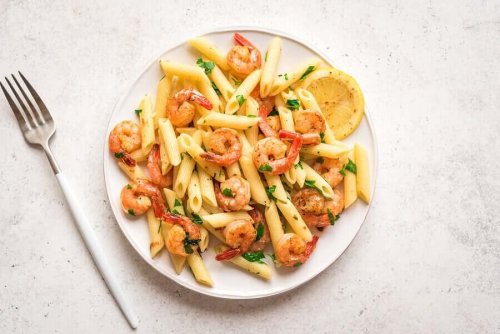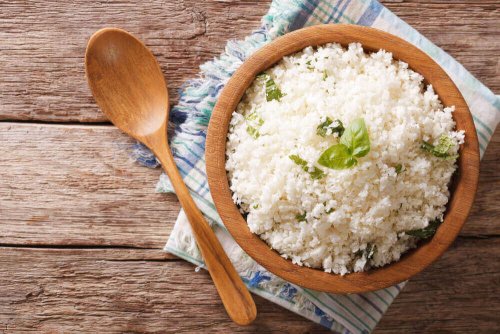Can I Eat Pasta and Rice at Night?


Written and verified by the nutritionist Saúl Sánchez Arias
A widespread belief in nutrition is that it isn’t a good idea to eat pasta or rice at night, either because it makes you gain weight or because it’s bad for your health. The truth is that these foods can be eaten at any time of the day, but taking into account what we’ll be sharing with you today.
The first thing you should consider is that these foods are energetic. Therefore, their role is to provide energy and help the body recover after exertion. Thus, they should be used for this purpose, leaving their taste aside.
When can you eat pasta and rice at night?
If you didn’t ingest a lot of carbohydrates during the day and you exercised (especially in the afternoon), it’s a good idea to consume these foods at night. Their main function will be to help you recover. Thus, they’ll help replenish muscle and liver glycogen.
If you don’t eat them and you do strenuous exercise the next morning, your risk of muscle injury increases. Therefore, it’s essential to ensure that glucose and muscle glycogen levels are appropriate before doing high-intensity exercise.
However, if you want to lose weight, a possible solution can be to cut out carbohydrates from your dinners and exercise while fasting. But if you do this, your morning exercise should be of low intensity to minimize risks.

Eating pasta and rice for dinner can be a good option for athletes. Also, when you consume few carbohydrates at other times of the day.
Eating pasta or rice at night has an energy function and is mainly oriented towards anaerobic athletes. Those individuals will greatly benefit from eating these foods. In fact, they’ll become a fundamental part of improving their performance.
These athletes need to consume a lot of carbohydrates when they use glycogen loading prior to a competition. In these situations, muscle and liver deposits empty first during 24-48 hours. Then, they overly saturate the reserves and exploit the availability of these nutrients in physical activity.
These strategies are typical in strength, weight category, or anaerobic endurance sports. In addition, they involve the consumption of rice and pasta in large quantities, also at dinner.
You should also read: Microbiota-Accessible Carbohydrates (MACs)
When you shouldn’t eat pasta and rice at night
In the case of sedentary people who don’t exercise regularly, carbohydrates at night aren’t very functional. They may make more sense in the first meals of the day, especially when it comes to reducing appetite.
However, it’s best to avoid them at night and, instead, consume protein and vegetables. Thus, you should consume big meals with low energy density that allow you to go to bed full and rest properly but don’t provide glucose that won’t be used nor stored as glycogen.
As the years pass, carbohydrates become less necessary. On the contrary, protein demands begin to increase to prevent muscle damage and destruction.
For this reason, pasta and rice, both at night and at any time of the day, become secondary or residual foods in the diet, behind protein and fats.

The consumption of pasta and rice at night should be limited to people who play physically demanding sports. Otherwise, they’re unnecessary and can lead to weight gain.
What about diabetics?
In this case, it’s necessary to differentiate type 1 diabetes patients from type 2 diabetes patients. In the case of the former, it’s necessary for them to consume a serving of carbohydrates at night to control the glucose curve.
However, in the case of the latter, it can be positive to cut out carbohydrates from dinner and even do certain fasts. This way, they’ll reduce body weight and improve glucose control, resulting in an improvement of the symptomatology of the disease and reduced associated complications.
Conclusion
You can eat pasta and rice at night as long as the reason behind this intake is related to sports. In the case of sedentary individuals or those who want to lose weight, the best thing is to reduce carbohydrate intake as much as possible.
The simplest thing in these cases is to not eat them at night because you’re less likely to be hungry while sleeping. Therefore, the calorie reduction will be more bearable. Keep that in mind!
All cited sources were thoroughly reviewed by our team to ensure their quality, reliability, currency, and validity. The bibliography of this article was considered reliable and of academic or scientific accuracy.
- Roach PJ., Glycogen and its metabolism. Curr Mol Med, 2002. 2(2): 101-20.
- Kanter M. High-Quality Carbohydrates and Physical Performance: Expert Panel Report. Nutr Today. 2018;53(1):35–39. doi:10.1097/NT.0000000000000238
- Lopez Minguez J., Gómez Abellán P., Garaulet M., Timing of breakfast, lunch, and dinner. Effects on obesity and metabolic risk. Nutrients, 2019.
This text is provided for informational purposes only and does not replace consultation with a professional. If in doubt, consult your specialist.








